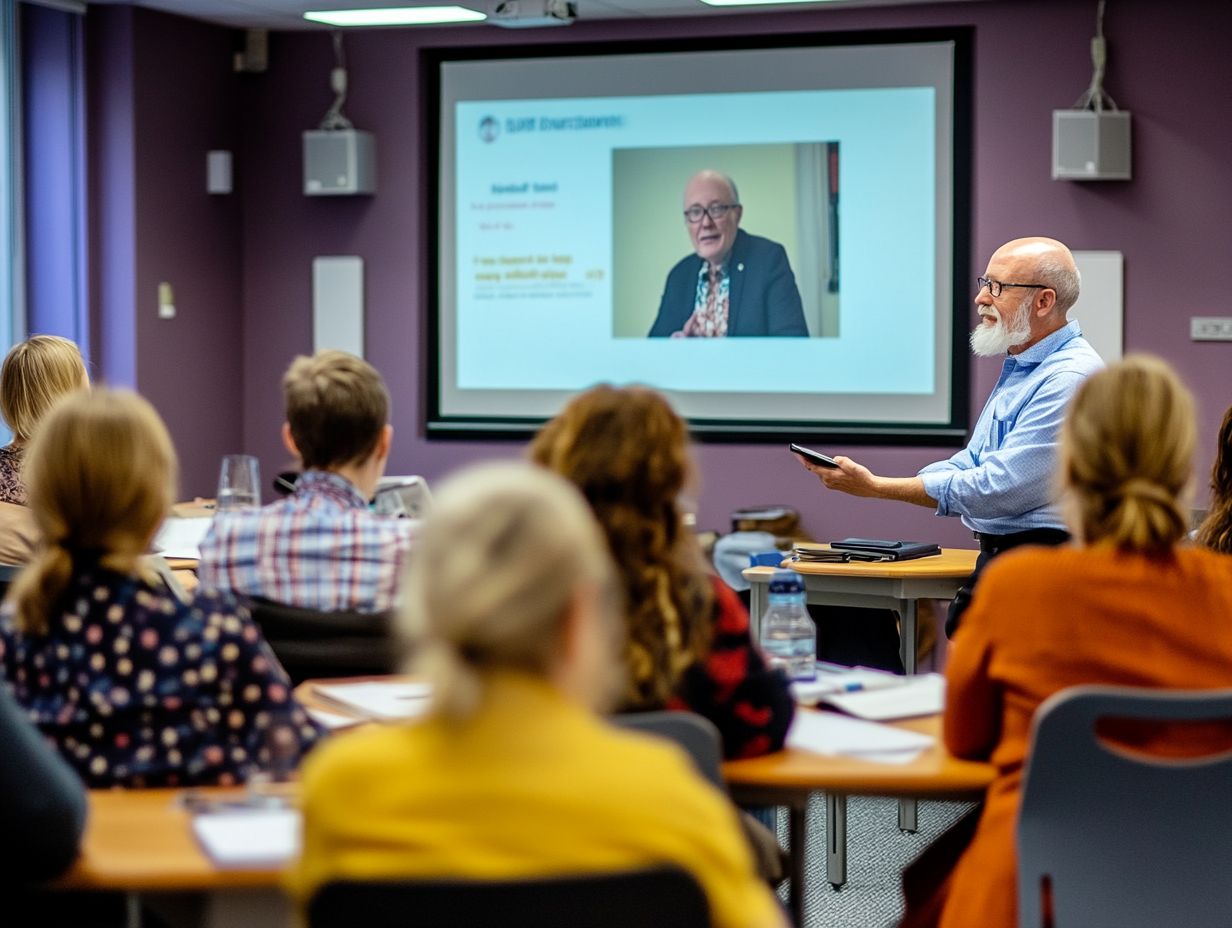Public speaking is a critical skill that can profoundly influence both personal and professional spheres.
Whether one is presenting in a meeting, delivering a toast at a wedding, or speaking at a conference, effective communication has the potential to create opportunities and leave a lasting impression.
This article will examine the fundamentals of public speaking, encompassing key techniques, strategies for overcoming apprehension, and tips for engaging the audience effectively.
Readers will discover practical steps for preparation and continuous improvement, ensuring they are always poised to excel when it matters most.
The Importance of Public Speaking Skills

Public speaking skills are essential in both personal and professional contexts, serving as a crucial form of communication that can significantly enhance an individual’s ability to connect with others.
Mastery of these skills cultivates confidence, enabling speakers to convey their messages effectively and engage their audiences.
Skilled public speakers articulate their thoughts with clarity and utilize techniques such as body language, vocal variety, and effective speech structure to create a lasting impact.
Moreover, strong communication skills in public speaking can enhance career prospects by making individuals more persuasive and relatable, which is vital in today’s interconnected world.
Benefits in Personal and Professional Life
Public speaking offers numerous benefits that extend beyond the mere delivery of a speech; it fosters confidence and enhances communication skills that are essential for both personal and professional development.
By engaging in effective speaking practices, individuals can refine their verbal abilities while also cultivating leadership skills that are highly valued across various industries.
This newfound confidence facilitates more effective interactions in social contexts, allowing individuals to engage in conversations with greater ease and assertiveness.
The capacity to articulate thoughts clearly can significantly enhance job prospects, as employers frequently seek candidates who demonstrate strong communication skills in team environments and can present ideas persuasively.
In the context of leadership, public speaking serves as a crucial tool, give the power toing individuals to inspire and motivate others while simultaneously strengthening their networking capabilities.
Ultimately, those who excel in this discipline often discover increased opportunities in their careers, rendering them invaluable assets to their organizations.
Understanding the Basics of Public Speaking
A comprehensive understanding of the fundamentals of public speaking is essential for individuals aiming to enhance their communication skills and effectively convey their message to an audience.
Key components of effective public speaking include:
- Mastering the structure of a speech
- Practicing vocal projection
- Employing body language to enrich the delivery
Together, these elements contribute to an engaging presentation. Familiarity with these principles can greatly reduce anxiety and increase confidence when addressing public gatherings.
Key Components and Techniques
Key components and techniques of public speaking encompass the mastery of speech organization, the effective use of body language, and the application of vocal variety to sustain audience engagement. A well-structured speech promotes clarity of message, while storytelling techniques can elicit emotions and foster a deeper connection with the audience.
Moreover, engaging openings are pivotal in capturing attention from the outset and establishing the tone for the entire presentation. The utilization of rhetorical devices, such as metaphors and analogies, enhances understanding and retention, enabling the audience to comprehend complex concepts with greater ease.
Additionally, the strategic incorporation of humor in speeches not only lightens the atmosphere but also cultivates rapport between the speaker and the audience, rendering the message more relatable.
Ultimately, these elements function in concert, transforming an ordinary speech into an unforgettable experience that resonates well beyond its conclusion.
Overcoming Fear of Public Speaking
Overcoming the fear of public speaking presents a significant challenge for many individuals, often manifesting as performance anxiety that can impede effective communication.
By identifying and addressing these prevalent fears, individuals can develop strategies to manage their anxiety and enhance their confidence as speakers.
Engaging in self-assessment and incorporating constructive criticism are critical steps in this developmental process.
Identifying and Addressing Common Fears

Identifying and addressing common fears associated with public speaking, such as performance anxiety and fear of audience judgment, is essential for developing a successful speaking presence. Effective speakers must learn to handle questions with confidence, express enthusiasm, and maintain their composure regardless of the audience’s reactions.
These fears often arise from past negative experiences, insufficient preparation, or an inflated perception of audience expectations. By conducting a comprehensive audience analysis, speakers can tailor their messages to resonate more effectively with listeners. This approach not only enhances the relatability of the content but also alleviates the fear of failing to meet audience expectations.
Thorough preparation enables speakers to become familiar with their material and anticipate potential questions, thereby increasing their confidence. When individuals focus on these strategies, they not only enhance their overall delivery but also cultivate stronger engagement with their audience, transforming anxiety into enthusiasm.
Preparing for a Speech or Presentation
Effective preparation for a speech or presentation is essential for successful delivery and engaging audience interaction. This process encompasses comprehensive speech preparation, employing practice techniques to rehearse the content, and cultivating a clear understanding of the audience in order to tailor the message appropriately.
Such preparation not only enhances the clarity of the presentation but also fosters greater confidence in the speaker.
Effective Planning and Preparation Strategies
Effective planning and preparation strategies are fundamental for developing a successful speech, commencing with meticulous speechwriting and pacing to sustain audience interest. The integration of visual aids can enhance comprehension, while engaging openings and compelling conclusions serve to captivate and maintain attention throughout the presentation.
To create a well-structured speech, it is essential to outline key points in a logical manner, ensuring that each idea transitions seamlessly into the next. Incorporating storytelling elements, such as anecdotes or pertinent statistics, can further exemplify the message, rendering it more relatable and memorable for the audience.
Utilizing rehearsal techniques, such as practicing in front of a mirror or with a test audience, can aid in refining delivery and timing. A clear emphasis on these components will not only bolster confidence but also significantly enhance the overall impact of the presentation.
Delivering a Powerful Speech
Delivering a compelling speech necessitates a blend of effective delivery techniques, audience engagement, and clarity of message to create a lasting impact.
Essential components include vocal projection to ensure that all audience members can hear the speaker clearly, as well as the strategic use of gestures and body language to emphasize key points effectively.
Tips for Engaging and Captivating Your Audience
Engaging and captivating an audience necessitates a combination of techniques that prioritize audience interaction, effective nonverbal communication, and clarity throughout the presentation. Establishing rapport with the audience is crucial, as it fosters a connection that enhances the overall impact of persuasive presentations.
To achieve this, speakers may strategically incorporate humor to create a more inviting atmosphere and simplify complex topics. By posing thought-provoking questions, they can stimulate audience participation and encourage individuals to reflect on their personal experiences related to the subject matter.
Integrating personal narratives provides a relatable context that enhances audience engagement and retention of the content.
Additionally, speakers must be attentive to nonverbal cues, including body language and facial expressions, as these elements significantly contribute to conveying enthusiasm and sincerity. Employing these techniques not only engages the audience but also strengthens their connection to the message being communicated.
Improving Your Public Speaking Skills

Enhancing public speaking skills necessitates committed practice, along with the integration of feedback and self-assessment to refine both delivery and content.
Engaging in constructive criticism from colleagues or mentors can provide valuable insights that promote growth and improve overall performance in a variety of speaking contexts.
Practicing and Receiving Feedback
Practicing and receiving feedback are essential components in the development of strong public speaking skills. Consistent speech practice enables individuals to refine their techniques and alleviate performance anxiety.
Engaging in speaking clubs or soliciting audience feedback can further enhance one’s ability to engage effectively and improve overall delivery.
By incorporating diverse rehearsal techniques, such as visualization and peer practice, speakers can craft more compelling narratives that resonate with their audience. Feedback from fellow members in a supportive environment, such as that provided by Toastmasters, can be invaluable in sharpening both content and presentation style.
This collaborative atmosphere fosters constructive criticism and insights, helping withdividuals in identifying areas for improvement while simultaneously boosting their confidence.
Over time, the integration of these elements not only facilitates personal growth but also enhances public speaking effectiveness, enabling individuals to connect more authentically with their listeners.
Continuing to Grow and Develop
To continue growing and developing as a public speaker, it is essential to seek out resources such as public speaking courses and networking opportunities that can enhance one’s skill set.
Engaging in ongoing professional development not only sharpens existing abilities but also introduces new techniques and perspectives that can significantly improve the overall public speaking journey.
Resources for Further Improvement
Numerous resources are available for individuals seeking to improve their public speaking skills, including courses and organizations such as Toastmasters, which offer constructive feedback and a supportive community for practice. Engaging with these resources can assist speakers in reducing performance anxiety and developing emotional appeal in their presentations.
Aspiring speakers may also consider exploring literature such as “Talk Like TED” by Carmine Gallo, which underscores the significance of storytelling and emotional connections in captivating an audience.
Additionally, online platforms such as Coursera and Udemy provide a range of public speaking courses tailored to various skill levels, allowing individuals to master techniques that address anxiety.
Participating in workshops facilitates real-time feedback, fostering a safe environment for practice. Utilizing these diverse resources give the power tos speakers throughout their journey, enhancing their confidence while enriching their capability to connect with listeners on an emotional level.
Frequently Asked Questions
1. What are some ways to improve public speaking skills?

There are several ways to improve public speaking skills, including practicing regularly, joining a public speaking club or group, and seeking feedback from others.
2. How can practicing regularly help improve public speaking skills?
Practicing regularly allows you to become more comfortable with speaking in front of an audience and helps you refine your delivery and content.
3. What is the benefit of joining a public speaking club or group?
Joining a public speaking club or group can provide a supportive environment for you to practice and receive constructive feedback from others who are also looking to improve their skills.
4. How can seeking feedback help improve public speaking skills?
Seeking feedback from others, whether it be from a friend, colleague, or a professional public speaking coach, can provide valuable insights and areas for improvement in your delivery and content.
5. Are there any resources or courses that can help improve public speaking skills?
Yes, there are many resources and courses available, such as online classes, workshops, and books, that can provide tips and techniques for improving public speaking skills.
6. Can anyone improve their public speaking skills, even if they are naturally shy or introverted?
Yes, anyone can improve their public speaking skills with practice, dedication, and the willingness to step out of their comfort zone. It may take more effort for some, but it is definitely possible to become a confident and effective public speaker.




